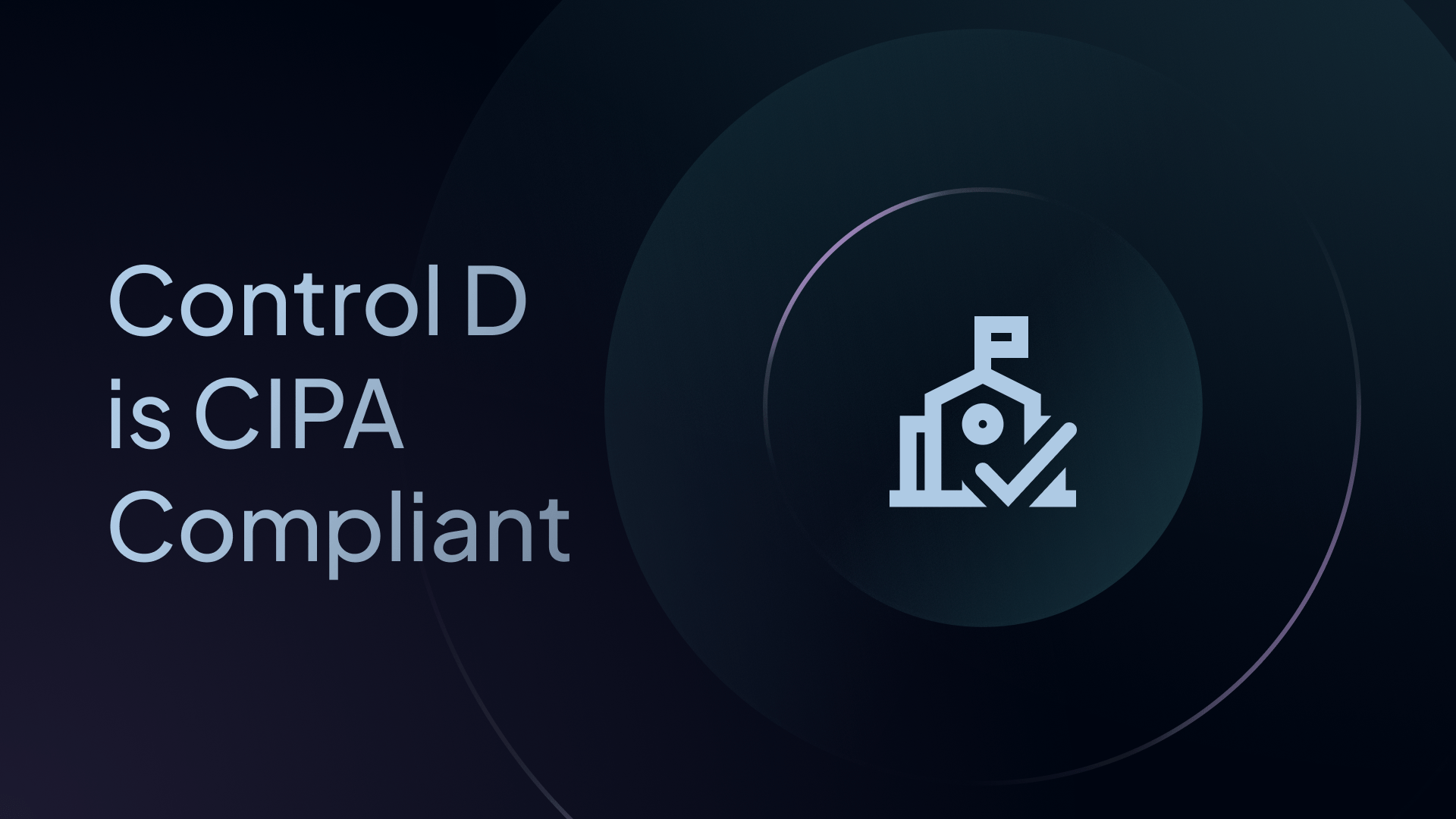Control D is CIPA Compliant
Adhere to CIPA regulations to protect students from online threats and inappropriate content with Control D.

We’re excited to announce that Control D is CIPA compliant!
Through the Children’s Internet Protection Act (CIPA), schools and libraries have a legal and ethical responsibility to protect children from the ‘dark side’ of the internet.
However, ensuring your institution is CIPA compliant can be challenging, placing additional strain on your IT resources.
That’s why it’s crucial to find a long-term solution that not only ensures you adhere to CIPA regulations but can also be deployed to your entire network and devices with minimal cost, effort, and management – enter Control D.
CIPA requirements
To be CIPA compliant, schools and libraries must address the following:
- Restriction of minors’ access to inappropriate content. (through effective web content filtering platforms for schools.)
- Restriction of minors’ access to harmful material.
- Safety and security when using email, chat rooms, and other communication channels.
- Unauthorized access, such as hacking and other illicit activities.
- Unauthorized disclosure of personal information of minors.
- Provide monitoring mechanisms and training to minors on how to use the internet ethically and responsibly.
The role of Control D in CIPA compliance
Control D offers a comprehensive suite of features to help schools become CIPA compliant. From advanced DNS filtering capabilities to comprehensive reporting and real-time DNS protection, our commitment to online security ensures that Control D evolves with emerging threats to become a future-proof solution for all educational institutions.
Beyond enabling CIPA compliance, Control D also serves as a proactive tool to promote digital citizenship and foster a culture of responsible internet usage among students, creating a focused learning environment.
Let’s explore how.
Customizable filtering against inappropriate content
Control D has intelligent filtering protocols to block access to ads and trackers, domains, and platforms deemed inappropriate for minors. This directly aligns with CIPA’s objectives of safeguarding students from harmful or inappropriate online content.
With nearly 1,000 Filters and Services, schools can customize their content filtering policies to suit their specific needs.
Filters allow you to block entire categories of domains in one sweep. Examples of Filters include:
- Adult Content – Sites that contain pornographic or sexual imagery, videos, and content.
- Dating – Dating platforms like Tinder, Hinge, Bumble, and more.
- Clickbait – Sites that publish hoaxes or disinformation.
- Drugs – Sites that sell drugs, alcohol, tobacco, and tobacco alternatives.
- Gambling – Platforms that promote or offer betting or other gambling methods.
- Social – Social media networks like Facebook, X, TikTok, and more.
You can have more granular control by utilizing Services, which is where specific websites and platforms can be blocked or unblocked. For instance, suppose you want to block all social media platforms except Facebook. This can be done with the click of a button.
If that wasn’t enough, you also have the option to enact Custom Rules, thus having total freedom and control over what’s resolved on your network and devices.
This level of control is ideal for schools with a wide age range of students or educational requirements. For example, elementary schools may want to implement stricter filtering policies than high schools.
Comprehensive monitoring, reporting, and analytics
Transparency and accountability are essential aspects of CIPA compliance since you need to prove you can correctly monitor your students’ online activity. Control D provides detailed reporting and analytics, which provide actionable insights for administrators.
You can monitor specific websites accessed by students, trends in overall traffic, and compliance violations. This information can be used to make informed decisions about network management and demonstrate regulatory compliance.
Real-time threat protection
Protecting students on your school network from malicious actors is essential; the best way to do this is to prevent attacks from occurring in the first place. Control D utilizes many security measures to safeguard children from cyber threats, such as DNSSEC, DNS encryption, and malware protection.
DNSSEC and DNS encryption ensure that all DNS traffic is unreadable. This means that third-party actors won’t be able to snoop on students’ online activity and manipulate DNS data to stage various cyberattacks such as phishing, DNS amplification, and DNS hijacking.
Traditional malware blocking involves utilizing known malware domains from a regularly updated source list. While this can suffice, it doesn’t protect you in real time. That’s why our AI-powered malware filter takes a proactive approach, using machine learning and predictive indicators to block domains that are highly likely to serve malware.
Seamless integration and scalability
Introducing a new technology into your existing IT infrastructure shouldn’t be a hassle, especially when you’re required to do so by law. Luckily, setting up Control D on all your devices and/or networks takes a matter of minutes, simplifying the entire process for you and minimizing disruption.
It can also be scaled up or down depending on your evolving needs, making it perfect for both large institutions as well as small schools and libraries.
Additional features of Control D
- Safe Search – Blocks all Not Safe for Work (NSFW) content on all supported search engines. It also completely blocks access to non-supporting search engines.
- Restricted YouTube – Restricted mode removes mature content and disables comments on all YouTube videos.
- VPN & DNS – Blocks VPN provider domains and other DNS services that can bypass restrictions.
- Piracy – Blocks common BitTorrent indexing sites and trackers.
Final Thoughts
Online safety is paramount, especially for young, impressionable kids. The CIPA was created to tackle this very issue, aiming to protect children from harmful and inappropriate content found on the internet.
By leveraging DNS management solutions like Control D, schools and libraries can adhere to CIPA regulations, nurture a safe learning environment, and educate students on internet safety.

